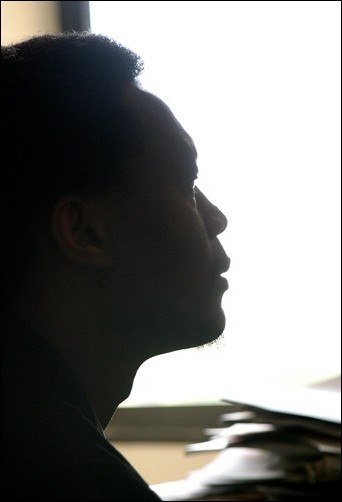Professor flees Rwanda genocide, adjusts to independence in States

Image: Professor flees Rwanda genocide, adjusts to independence in States:Kimberly Park/State Hornet Professor Alexandre Kimenyi left Rwanda in 1971 to start a new life in the United States and graduate studies at UCLA.:
May 5, 2004
Kendra Keene
State Hornet
Very few people know of the genocide of Rwanda.Though it was only 10 years ago that astate that was oncecalled “a tropical Switzerland in the heart of Africa”starteda war that would soon leave up to a million peopledead.
On April 6, 1994, a plane carrying Rwanda’s president wasshot down and the genocide began. The two groups, the Tutsisand the Hutus in Rwanda, who once shared land for over 600 yearsbegan to divide.
The Tutsis, who were primarily the landowners,were accusedof killing the president, and soon by over theradio and wordof mouth the Hutus &- people who worked the land &- wereled to believe that it was their duty to wipe out theTutsisfrom existences. This was the event that would later berefereed to as the “Final Solution,” to kill allTutsis.
April 6 of last month marked the 10th anniversary of the Rwandagenocide, which was one of the biggest massacres since theHolocaust. The 10th anniversary marked apersonalmeaning for Sacramento State professor Alexandre Kimenyi who grewup in Rwanda. In 1971 Kimenyi left hisfamilyforthe United Statesto gotoUCLAand todograduate studieswork.
Whenhe first came to the United States he had a difficulttime adjusting to the independent lifestyle he was forced tolive.
“Back home we had a very big family, it was verynice. Everyone would help out each other,” Kimenyisays. “It’s completely different here. I was by myselfto cook, (while) back home your family cooks for you and you arenever by yourself.”
Kimenyi had hoped to return back to Rwanda with plans tocontribute to the development of his unstablecountry.Though two years after being in the UnitedStatesin1973 “my entire family has beenexterminated (because of)there Tutsis eternity,”Kimenyi explains.
“Sometimes you feel guilty being a survivor,”expresses Kimenyi.”But I have to tell the story as a survivorand what happened will not be forgotten.”
Kimenyi currently teaches six ethnic studies courses thissemester and has said that: “Ialways wanted to teach…. I explain to students that it’s important to beaware. If people are aware and capable we can prevent thisfrom happening again.”
Kimenyi has done much research on both genocide and holocauststudies and whenasked if he will ever be able to understandwhat he calls “man’s inhumanity to man” he pausesand says, “As a human we have to believe in the good and thebad, I am still optimistic of mankind, as long as people have eachother and are able to survive to make sure there is asurvival.”
Overtime Kimenyi is able to realize a great importance in peoplebeing aware of the genocide of Rwanda.
“University students need to know about the genocide thattook place in the 20th century. If people learn hopefully wewill be able to make efforts to make sure this will never happenagain.”
Kimenyi currently lives in Elk Grove with his wife and threechildren and is heavily involved in Amahoro People’s Congressand Friends of Rwanda Association, which help orphan children inRwanda support themselves.











































































































































